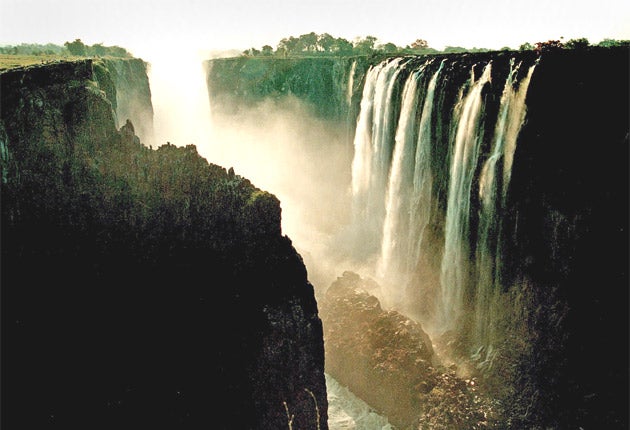Southern Africa deal produces the world's largest nature reserve

It's not your average park. Entering from the west in Angola, it would conservatively take you more than a month of continual driving to come out the other side in eastern Zimbabwe – assuming any vehicle could do it.
It is 15 times the size of Tanzania's epic Serengeti reserve and home to the largest population of elephants on the continent. And yet few people working outside African environmental circles will have heard of Kavango-Zambezi Transfrontier Conservation Area, or Kaza for short. Straddling five countries and 36 national parks, making it the largest nature area anywhere in the world, Kaza was made a legal fact last month as Angola, Namibia, Botswana, Zambia and Zimbabwe signed up to the scheme, linking up a who's who of southern African safari stars: from the Victoria Falls to the Okavango Delta and the Zambezi, Chobe-Linyanti, Kwando and Cuito river systems. The reserve's flora is equally phenomenal with at least 3,000 species, some 100 of which are endemic, as well as more than 600 bird species.
The legal establishment of the reserve has been welcomed warmly by conservationists: "Eco-systems don't respect political boundaries," said Dr Deon Nel, head of the biodiversity unit at the World Wide Fund for Nature in South Africa. "In order to fully conserve eco-systems we need to look beyond these boundaries to processes, like migration routes that work on a larger scale. Many of these processes are lost in national parks."
South Africa's world-famous Kruger National Park has suffered in recent years, as rivers that feed the reserve have been damaged beyond the park's boundaries and outside of its scope to remedy.
Experts have pointed out that fragile eco-systems will be more resilient to threats such as climate change if they are not fractured by political borders that prevent high-impact animals such as elephants from ranging across larger areas.
While the scientific benefits of the transfrontier dream have long been accepted, the political agreement has been slow in arriving. The concept of a Southern African wildlife sanctuary was presented at a regional talking shop as long ago as 1993, but 10 years on, Namibia's then-president Sam Nujoma was still describing it as a "golden opportunity" that hadn't been seized.
Turning the mosaic of national parks, hunting reserves, conservation areas and rivers into a network has focused on the so-called "four corners" region: the point at which Botswana, Namibia, Zambia and Zimbabwe meet, around Impalila Island in Namibia. Angola, which early on was still emerging from a disastrous civil war, was included because of its importance as the source of most of the regions' rivers.
The treaty signed in Angola's capital, Luanda, in August created a reserve roughly the size of Sweden at 450,000 sq km. However, much of the immense land area covered by the agreements – outside established destinations like Victoria Falls – lacks the infrastructure at present to absorb many more tourists. The challenges in the meantime are considerable. During Zimbabwe's long financial crisis, its once-envied wildlife facilities have gone backwards ruinously. One of the first items on the agenda for the Kaza authorities is an appeal for funds for the removal of landmines that still litter the area gazetted within Angola, a lethal hangover from the civil war.
Join our commenting forum
Join thought-provoking conversations, follow other Independent readers and see their replies
Comments
Bookmark popover
Removed from bookmarks